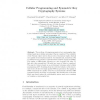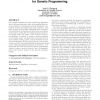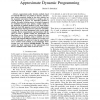117 search results - page 8 / 24 » On the behavioral diversity of random programs |
STOC
2001
ACM
14 years 8 months ago
2001
ACM
: We analyze a randomized pivoting process involving one line and n points in the plane. The process models the behavior of the RANDOM-EDGE simplex algorithm on simple polytopes wi...
GECCO
2003
Springer
14 years 1 months ago
2003
Springer
Abstract. The problem of designing symmetric key cryptography algorithms based upon cellular automata (CAs) is considered. The reliability of the Vernam cipher used in the process ...
GECCO
2010
Springer
14 years 1 months ago
2010
Springer
The original mechanism by which evolutionary algorithms were to solve problems was to allow for the gradual discovery of sub-solutions to sub-problems, and the automated combinati...
CDC
2010
IEEE
13 years 3 months ago
2010
IEEE
Approximate policy iteration methods based on temporal differences are popular in practice, and have been tested extensively, dating to the early nineties, but the associated conve...
BMCBI
2007
13 years 8 months ago
2007
Background: Current approaches to parameter estimation are often inappropriate or inconvenient for the modelling of complex biological systems. For systems described by nonlinear ...




